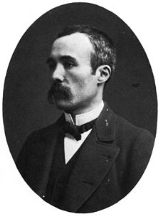
Georges Clemenceau
Overview
Statesman
A statesman is usually a politician or other notable public figure who has had a long and respected career in politics or government at the national and international level. As a term of respect, it is usually left to supporters or commentators to use the term...
, physician and journalist. He served as the Prime Minister of France
Prime Minister of France
The Prime Minister of France in the Fifth Republic is the head of government and of the Council of Ministers of France. The head of state is the President of the French Republic...
from 1906 to 1909, and again from 1917 to 1920. For nearly the final year of World War I he led France, and was one of the major voices behind the Treaty of Versailles
Treaty of Versailles
The Treaty of Versailles was one of the peace treaties at the end of World War I. It ended the state of war between Germany and the Allied Powers. It was signed on 28 June 1919, exactly five years after the assassination of Archduke Franz Ferdinand. The other Central Powers on the German side of...
at the Paris Peace Conference
Paris Peace Conference, 1919
The Paris Peace Conference was the meeting of the Allied victors following the end of World War I to set the peace terms for the defeated Central Powers following the armistices of 1918. It took place in Paris in 1919 and involved diplomats from more than 32 countries and nationalities...
in the aftermath of the war
Aftermath of World War I
The fighting in World War I ended in western Europe when the Armistice took effect at 11:00 am GMT on November 11, 1918, and in eastern Europe by the early 1920s. During and in the aftermath of the war the political, cultural, and social order was drastically changed in Europe, Asia and Africa,...
. He is commonly nicknamed "Le Tigre" (The Tiger) and "Père-la-Victoire" (Father Victory) for his determination as a wartime leader.
Georges Clemenceau was the leader of France at this time.
Unanswered Questions
Quotations
It was I who gave the title "J'accuse" to Zola's letter.![]()
Letter (19 June 1902), in which he claims to have chosen the headline title for Émile Zola's famous open letter on the Dreyfus affair|Dreyfus affair, as quoted in Clemenceau (1974) by D. R. Watson, and Brewer's Famous Quotations : 5000 Quotations and the Stories Behind Them (2006) by Nigel Rees|Nigel Rees
Politique intérieure, je fais la guerre; politique extérieure, je fais la guerre. Je fais toujours la guerre.![]()
My home policy: I wage war. My foreign policy: I wage war. All the time I wage war.
War is a series of catastrophes that results in a victory.![]()
Statement to Woodrow Wilson at the Paris Peace Conference, 1919|Paris Peace Conference (12 January 1919), as quoted in The Macmillan Dictionary of Political Quotations (1993) by Lewis D. Eigen and Jonathan Paul Siegel, p. 689
There are only two perfectly useless things in this world. One is an appendix and the other is Poincaré.![]()
Referring to his rival Raymond Poincaré|Raymond Poincaré, as quoted in Paris 1919 : Six Months That Changed the World (2003) by Margaret MacMillan, p. 33
Il est plus facile de faire la guerre que la paix.![]()
It is easier to make war than make peace.
Oh, to be seventy again!![]()
Exclamation to a friend on his 80th birthday (1921) as an attractive young woman passed them while walking down the Champs-Élysées|Champs-Élysées, as quoted in Ego 3 (1938) by James Agate. Similar remarks have also been attributed to Oliver Wendell Holmes, Jr. ie: "Oh, to be eighty again."

